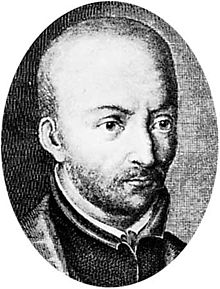- Luis de Molina
-
For the baseball figure, see Luis Molina (baseball).
Luis de Molina (September 1535, Cuenca, Spain – October 12, 1600, Madrid, Spain), was a Spanish Jesuit priest and a staunch Scholastic defender of 'human liberty' in the Divine grace and human liberty controversy of the Renaissance (Molinism).
Having at the age of eighteen become a member of the Society of Jesus, he studied theology at Coimbra, and afterward became professor in the university of Évora, Portugal. From this post he was called, at the end of twenty years, to the chair of moral theology in Madrid, where he died.
Besides other works he wrote De liberi arbitrii cum gratiae donis, divina praescientia, praedestinatione et reprobatione concordia (4 vo., Lisbon, 1588); a commentary on the first part of the Summa Theologiae of Thomas Aquinas (2 vols., fol., Cuenca, 1593); and a treatise De jure et justitia (6 vols., 1593-1609).
It is to the first of these that his fame is principally due. It was an attempt to reconcile, in words at least, the Augustinian doctrines of predestination and efficacious grace with the new ideals of the Renaissance concerning human's free will. Assuming that man is free to perform or not to perform any act whatever, Molina maintains that this circumstance renders the grace of God neither unnecessary nor impossible: not impossible, for God never fails to bestow grace upon those who ask it with sincerity; and not unnecessary, for grace, although not an efficient, is still a sufficient cause of salvation (gratia mere sufficiens). Nor, in Molina's view, does his doctrine of free will exclude predestination. The omniscient God, by means of His scientia media (the phrase is Molina's invention, though the idea is also to be found in his older contemporary Fonseca), or power of knowing future contingent events, foresees how we shall employ our own free-will and treat his proffered grace, and upon this foreknowledge he can found his predestinating decrees.
These doctrines, which opposed both traditional understanding of Augustinism and Thomism concerning the respective roles of free-will and efficacious grace, and the teachings of Martin Luther and John Calvin, excited violent controversy in some quarters, especially on the part of the Dominican order and of the Jansenists, and at last rendered it necessary for the pope (Clement VIII) to interfere. At first (1594) he simply enjoined silence on both parties so far as Spain was concerned; but ultimately, in 1598, he appointed the Congregatio de auxiliis Gratiae for the settlement of the dispute, which became more and more a party one. After holding very numerous sessions, the congregation was able to decide nothing, and in 1607 its meetings were suspended by Paul V, who in 1611 prohibited all further discussion of the question de auxiliis and of discussions about efficacious grace, and studious efforts were made to control the publication even of commentaries on Aquinas[citation needed]. The Molinist subsequently passed into the Jansenist controversy.
See also
Bibliography
- SMITH, Gerard (ed): Jesuit thinkers of the Renaissance, Milwaukee (USA), 1939, pp.75-132.
A full account of Molina's theology will be found in Gerhard Schneeman's Entstehung der thomistisch-molinistischen Controverse, published in the Appendices (Nos. 9, 13, 14) to the Jesuit periodical, Stimmen aus Maria-Laach. To the lay reader may be recommended Ernest Renan's article, Les congregations de auxiliis in his Nouvelles etudes d'histoire religieuse.
References
 This article incorporates text from a publication now in the public domain: Chisholm, Hugh, ed (1911). Encyclopædia Britannica (11th ed.). Cambridge University Press. The article can be found here: [1]
This article incorporates text from a publication now in the public domain: Chisholm, Hugh, ed (1911). Encyclopædia Britannica (11th ed.). Cambridge University Press. The article can be found here: [1]- An article by Alfred J. Freddoso on Luis Molina's thoughts.
- Article on Molina from Catholic Encyclopedia (1911)
- Article on Molinism from Catholic Encyclopedia (1911)
- Ulrich L. Lehner (ed.), Die scholastische Theologie im Zeitalter der Gnadenstreitigkeiten (monograph series, first volume: 2007) http://www.bautz.de/rfn.html
Categories:- 1535 births
- 1600 deaths
- People from Cuenca
- University of Coimbra alumni
- Spanish theologians
- Spanish philosophers
- Spanish writers
- Spanish Jesuits
- Roman Catholic theologians
- Roman Catholic philosophers
- University of Évora faculty
- 16th-century Spanish people
- 16th-century Roman Catholic priests
- Mercantilists
Wikimedia Foundation. 2010.

